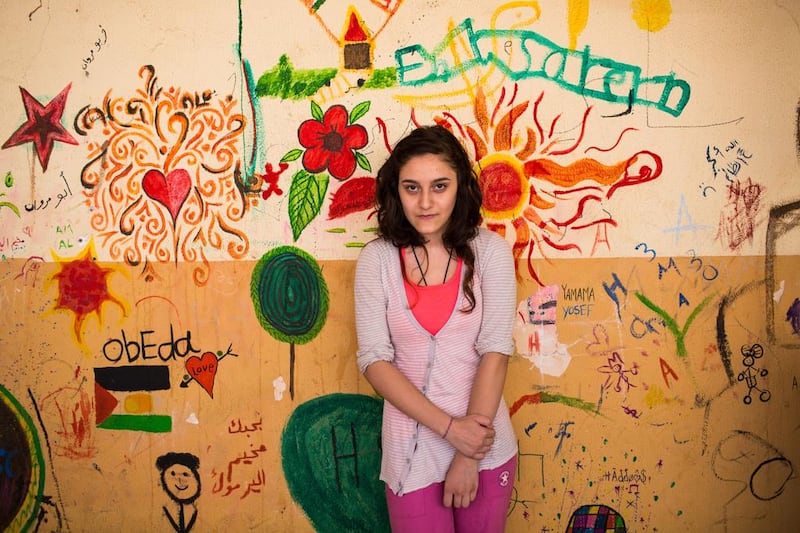BEIRUT // For Hilda, a 16-year-old Syrian girl living in Beirut, the future is on hold.
When an explosion shattered the living-room window in her family’s home in the Palestinian Yarmouk Camp in Damascus seven months ago, they picked up what they could and fled to Lebanon.
It’s now becoming apparent that more was left behind than furniture and possessions. When Hilda began living in a single room in the Bourj Al Brajneh Palestinian camp in Beirut with her brother, sister, mother and father, it was also the end of her education.
The nearest secondary school open to her is too far away to walk to and transport is impossible for her family to afford.
“I spend my time in the camp, helping my mother and taking care of my father,” Hilda said. “I wanted to be a designer, but I don’t know what I will do now.”
Her plight is shared by two million Syrian children – an estimated 40 per cent of all school-age children – who are no longer receiving education of any kind because of the civil war, according to Unicef, the United Nations children’s fund.
“For a country that was on the verge of achieving universal primary education before the conflict started, the numbers are staggering,” says Marixie Mercado, a Unicef spokeswoman.
“The risk of a lost generation becomes more acute with each day that children are out of school.”
Many, like Hilda, are living as refugees in Lebanon and Jordan where the educational infrastructure cannot handle the influx of students. Lebanon’s school system, for instance, is set up for 300,000 Lebanese pupils who returned to school this month.
It’s no match for the estimated 550,000 Syrian children now living in the country. In Jordan, Unicef estimates only a third of the 150,000 school-age children are going to school.
Lebanon’s minister of education, Hassan Diab, says the school system can accommodate only an extra 50,000 children this year, and then only if foreign donors help to pay teachers’ salaries.
Syrian children still inside their country have also been unable to continue their education because of fighting and the requisition of many schools as shelters for families whose homes were destroyed.
Hilda’s mother, Abeer, has done her best to keep her children occupied and learning. “Our situation is so difficult,” she said. “I almost wish we could just go back to Damascus. Life seemed so much easier. My children didn’t just go to school. They were involved in music and theatre clubs. Here they have almost nothing.”
Making matters even worse, her husband, Sohaib, was partially paralysed last week by a stroke. They had also been informed that they would have to find a new home within a month after the owners of their room decided they wanted it back.
Hilda and her siblings have found one respite: they turned the wall of the building they share with several other families into a colourful mural of flowers and doodles.
Access to schools is a crucial element of education for displaced children, but other issues are also exacerbating the risk of a “lost generation”.
Curriculum differences are holding back the few children who are able to attend school. For instance, science is taught in Arabic in Syria but in Lebanon it’s taught in French or English. And even where there are classroom facilities, there aren’t nearly enough teachers to handle the demands of the growing Syrian communities.
Some families, facing enormous difficulty in affording basic necessities, send their children out into Beirut to beg or shine shoes for money.
The parents of Mohammed Hazineh, an 11-year-old boy living with his family in the Palestinian Shatila camp in Beirut, successfully enrolled him in a United Nations-run elementary school after escaping Syria a year ago. But he has attended only sporadically because he has problems with his eyesight and can’t see properly. The family can barely secure clean drinking water, so glasses are an impossible luxury.
“Even if he could see better, this is no place for studying,” said Mohammed’s mother, Jaber Firyal, 42. She showed their temporary home — a dark and dank room where sewerage was seeping through the ceiling.
Her husband, Nader Hazineh, has been able to work for only five days in the year they have lived in Shatila. They subsist on handouts from non-profit organisations based in the camp, but even those can come irregularly, he said.
“We realise now that our situation in Damascus, even with bombs and fighting, was paradise,” said Mr Hazineh. “Everything was so much cheaper. I had work. I felt useful.”
bhope@thenational.ae





